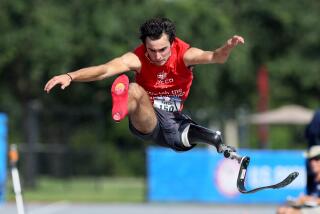Cash Woes Frustrate Olympian : Athletics: Gold medal swimmer has had little luck in raising funds to compete in the upcoming Paraplegic Olympics in Barcelona.
- Share via
From the edge of the pool, Brent Gibson looks like any other swimmer. His arms push through the lane with fierce strides. He gains strength with each breath, and, before long, it’s apparent the fastest stroke in the water belongs to this 26-year-old Kiwi.
But the wheelchair by the side of the pool tells as much about Gibson as the way he attacks the water--relentlessly, with the kind of calm confidence that only the best can deliver.
Gibson is an Olympic athlete. He won the gold medal in the 200-meter freestyle and captured two bronze medals in the 1988 games in Seoul, South Korea.
Gibson’s arena is the Paraplegic Olympics, held every four years at the site of the “other” Olympics but only after “able-bodied” competitors, as he calls them, get their turn before the eyes of the world. More than 3,500 are expected for this year’s event in Barcelona, Spain.
Gibson, who was born and grew up in the small farming village of Matamata, New Zealand, now lives in San Diego with his new American wife and has a chance to compete, for the first time, with the U.S. “para” swim team. Gibson’s Seoul medals were won for New Zealand.
He came to the United States three years ago to pursue a master’s degree in business in Los Angeles, but got sidetracked and ended up in San Diego, where he met his wife. Winning a gold medal and getting married three months ago are, he said, his greatest achievements.
His biggest problem is not “this disability,” which he acquired at age 9 after his best friend accidentally shot him with a .22-caliber rifle, but money or the lack thereof. Speedo, the international swimwear company, sponsors the U.S. swimming team--able-bodied only.
Gibson and his teammates have to rely on private contributions, meaning, for the most part, their own pocketbooks. He’s looking for $6,000 total--$3,500 to cover round-trip air fare, as well as food and lodging in Spain, and the rest to pay debts.
He’s already in the hole for money spent flying to and from New York, where he competed in two events to earn the right to go for the gold in Barcelona. A purchasing analyst for a local medical supply firm, he got $1,000 from his bosses.
He hopes to be in Barcelona for the start of the Paraplegic Olympics on Aug. 29, and the experts say he could easily win another gold medal--he has the fastest U.S. time for a disabled person in the 400-meter freestyle--but Gibson isn’t convinced it will happen, except with renewed debt.
“The whole problem is, I’m not very visible as an athlete,” he said Monday afternoon, before a workout at the Canyonview pool at UC San Diego, where he trains twice a day under the auspices of the school’s “masters” swimming program.
“I do the same amount of training as an able-bodied swimmer,” he said. “I do the same amount of training, with the same dedication. I’m like any other swimmer--without the use of my legs.”
Some would disagree. Some would say Gibson is more dedicated and trains harder than able-bodied counterparts, only because he has to. They have legs to command.
Howard Burgeson, a marketing specialist for UCSD Medical Center, works with Gibson’s wife, Emily Alvarez, and, after learning of her husband’s story, decided to help him.
Burgeson has begun a grass-roots fund-raising effort, but unless he gets an infusion of fresh cash soon, he said, Gibson will get to Barcelona strictly on his own and only through deeper debt.
“Here’s this guy who has this incredible athletic background but is a very humble guy who has this hard time asking for money,” Burgeson said. “Like a lot of athletes in his position, he’s much better at doing his sport than he is at asking for money.”
As Burgeson and others have said, Gibson looks like a perfect antithesis to the so-called “Dream Team,” the U.S. men’s Olympic basketball squad made up largely of multimillionaire superstars from the professional National Basketball Assn.
Gibson is more the traditional Olympic ideal--a gifted athlete, toiling in obscurity and with his own determination and resources paying the way.
“To me, he represents what sports should be about,” Burgeson said. “Nowadays, all we seem to hear about are pro athletes being paid millions of dollars and not being happy. There are holdouts, lawsuits and all this junk. And here’s this guy who embodies the essence of what it should be about--the spirit of Olympic competition--and he has trouble making ends meet. It doesn’t seem right.
“He’s just trying to do his best. He’s got the talent, he’s exhibited the drive and potential, and he’s won a gold medal. He just can’t find the money to go over. It’s a shame.”
Gibson often sounds like an artist--a painter, a dancer, an actor--trying to practice a craft with little hope of making next month’s rent. But, unlike them, he has no hope for grant money, and so far, his responses from the corporate world have been not encouraging and even cold.
“Maybe it’s the recession. I try not to let it affect my concentration, but initially, it did,” he said. “I first sent out 25 letters, all rejections, and two were really rude. One particular secretary told me her company’s (chief executive officer) threw it in the rubbish. I said, ‘Well, should I even call back?’ She said, ‘Naw, don’t bother. He’s just not interested.’ ”
Gibson is doubly dismayed, because he loves everything else about the States. He longs to become an American citizen, which he vows to do in two years, but, he says, it’s harder here to make it as an amateur swimmer, especially one paralyzed from the waist down.
The paraplegic swim team in New Zealand has all its expenses paid, Gibson said. And he’s “stunned” that it isn’t that way in the States, where he assumed it would be just as easy, maybe more so.
It’s even more frustrating, he said, to confront an obstacle that seems insurmountable when much of his life has been lived getting beyond the seemingly insurmountable.
When pressed, Gibson will talk about “the accident,” which occurred when he and “me mate” were “monkeying around” with a gun in the cow shed of his friend’s farm.
“We were pointing it at each other,” he said. “He pointed it at me, and he pulled the trigger . . . “
Still, the two have remained lifelong friends.
“It was a small community,” Gibson said. “Everyone knew he wasn’t trying to blow me away. His family felt terrible. He felt terrible. I was 9 . . . I would have hated to be 19 when it happened, or 29. But as a 9-year-old, you just charge on. At that age, it’s like breaking your leg--permanently.”
Gibson had learned to swim when he was 5 and at 11 began his competitive crusade. Medical supervisors “just threw me in the water, to get me out of my chair, and I took to it. I like getting out of my chair as much as possible, and swimming remains the easiest way by far to do it.”
Gibson is also adept at ocean swimming, but so far has abstained from wheelchair racing, which he contends is less athletic than paraplegic swimming.
His biggest difficulty, which isn’t apparent when he’s swimming alongside “able-bodied” types, is balance. As he says, “Obviously, it’s all upper body,” and his is as toned and developed as any bodybuilder’s, although he never lifts weights.
From the edge of the pool, waiting to lower himself and plop in, he looks like two different people--a muscular man from the waist up, attached to legs that don’t seem to fit the Olympian torso.
“There’s no dive, no tumble-turn,” he says of what separates him from other swimmers. “It is just like being an able-bodied swimmer, except you’ve lopped off the legs or tied them up.”
Asked if he had ever felt anger about the accident and the fate it dealt him, he paused and said with his Kiwi accent, “Aw, yeah. . . . But I turn that around and say, what would I be doing if the accident hadn’t happened. I probably wouldn’t be a couch potato, but I probably wouldn’t be an Olympian either.”
More to Read
Go beyond the scoreboard
Get the latest on L.A.'s teams in the daily Sports Report newsletter.
You may occasionally receive promotional content from the Los Angeles Times.







